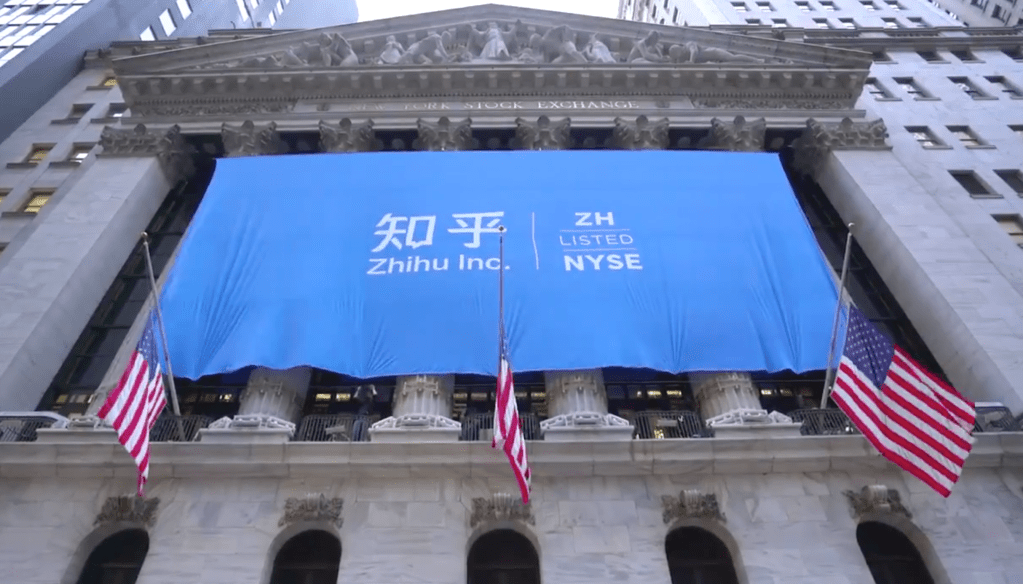China’s largest question and answer platform, Zhihu, began trading in New York at $9.50 per share at the lower end of its IPO range, valuing the company at about $5.3 billion.
The aggregate offering size of Zhihu’s IPO and the concurrent private placements is $772.5 million, assuming the underwriters do not exercise their option to purchase additional ADSs. With Zhihu’s sizable flotation, some Silicon Valley executives and investors may start to pay more attention to this 10-year-old company from China that was once simply regarded as the “Quora of China.”
Q&A remains at the core of Zhihu, which means “do you know” in classical Chinese, but the service has become much more than the American counterpart that was founded two years before it.
“I think Quora is a good product, but I think Quora today still equals Quora 10 years ago,” said Kai-Fu Lee, whose investment firm Sinovation Ventures is a seed investor in Zhihu and is the company’s largest outside shareholder with a 13% stake.
“Zhihu has already grown up and is on the path to becoming a multifaceted super app centered around knowledge, while Quora is still a question and answer website with an app,” added Lee, an AI expert and an avid Zhihu contributor himself.
Aside from facilitating Q&As, Zhihu has also dabbled in premium content, live videos and audio, and online education, among other forms that it believes are ripe for sharing knowledge.
Today, Zhihu generates about 70-80% of its revenues from advertising, according to its prospectus, though other businesses like membership and e-commerce are growing financial contributors, a sign that it’s working to diversify monetization streams.
The willingness of Chinese startups to “reinvent themselves and cannibalize their own success” is what differentiates them from American companies, Lee observed.
“Because they know if they don’t do that, their challenger will, and they are ambitious towards building the super app as a dream. I think American entrepreneurs tend to build something really good and light, partner with other companies and stay in their comfort zone,” said the investor who was the president of Google China in the late 2000s.
“I really think that Silicon Valley and U.S. entrepreneurs should look to China for ideas or inspirations of doing things differently.”
Conflict of interest
From 2019 to 2020, Zhihu’s monthly active users grew from 48 million to 68.5 million, an indication that the platform has thrived beyond the small clientele of Chinese tech elites, investors and academics whom it first attracted. A new mother could be on Zhihu asking for postnatal tips and a Foxconn worker may be on the site sharing her factory stories.
Zhihu’s revenue increased from 670.5 million yuan ($102 million) in 2019 to 1.4 billion yuan in 2020, while its net loss shrank from 1 billion yuan to 517.6 million yuan. It may seem at first that commercialization is at odds with Zhihu’s principle rooted in open user collaboration. Oftentimes, answerers are not economically incentivized but simply participating for leisure. But Zhihu is for-profit from day one and needs income after all.
It’s a always delicate matter to balance a product’s commercial and user interests. The bottom line is to be vigilant and deliberate about the kind of ads or sponsored content allowed on the platform. Restraint could mean smaller advertising revenue, but a medical ad scandal that hit Chinese search giant Baidu back in 2016 showed how easily user trust could be lost. Well-placed and responsible ads, on the other hand, could bring greater returns for both advertisers and the platform.
On the innovative side, not all users have appreciated Zhihu’s new features. Zhihu has recently upped its ante on short videos, which have become the default medium through which many Chinese users receive information, thanks to more affordable connectivity and industry forerunners like Douyin and Kuaishou. But some users argue that short videos by nature verge on entertainment and are obtrusive for the more serious, text-focused Zhihu.
How Zhihu has become one of China’s biggest hubs for experts
Zhihu has other interests to balance. Its shareholders include Tencent, Baidu and Kuaishou, which are “super apps” themselves for their extensive functionalities. They all have traffic deals with Zhihu. For example, Zhihu content is surfaced in the search results on WeChat, which has its own search engine.
While joining hands with giants could drive user growth for a smaller player, dependence on outsiders could also handcuff a startup, forcing it to give away significant shares too early and joggle the interests of multiple allies, who could be rivals themselves.
Lee declined to comment on Zhihu’s relationship with any specific partner, but he did indicate that Zhihu doesn’t currently have an “overreliance” on partners and that the firm keeps “natural working business relationships with them.”
“That also speaks to the purity and the ambition of the Zhihu team that it hopes to maintain more independence by making more friends,” said Lee.





























Comment